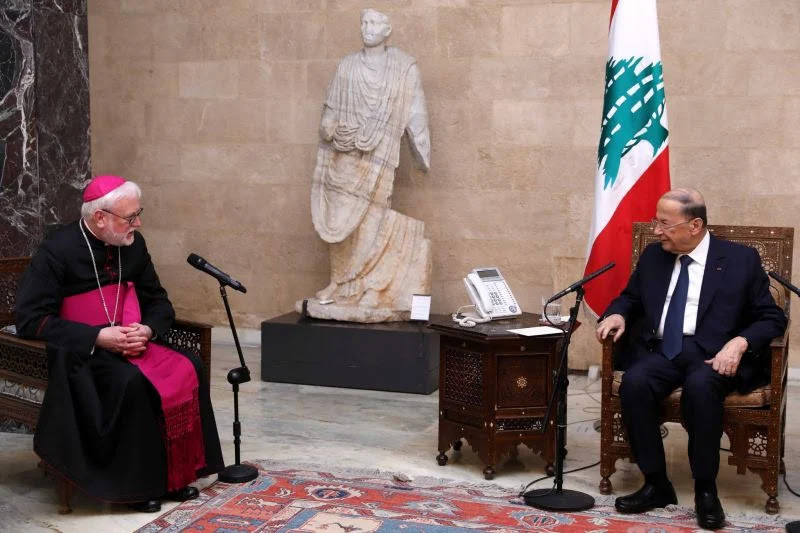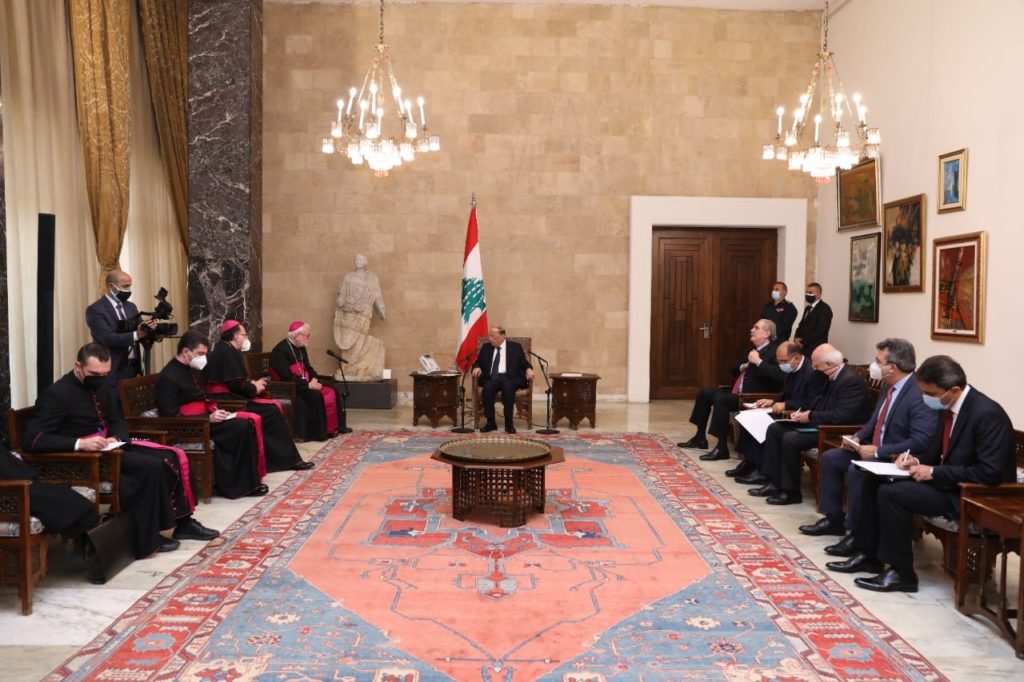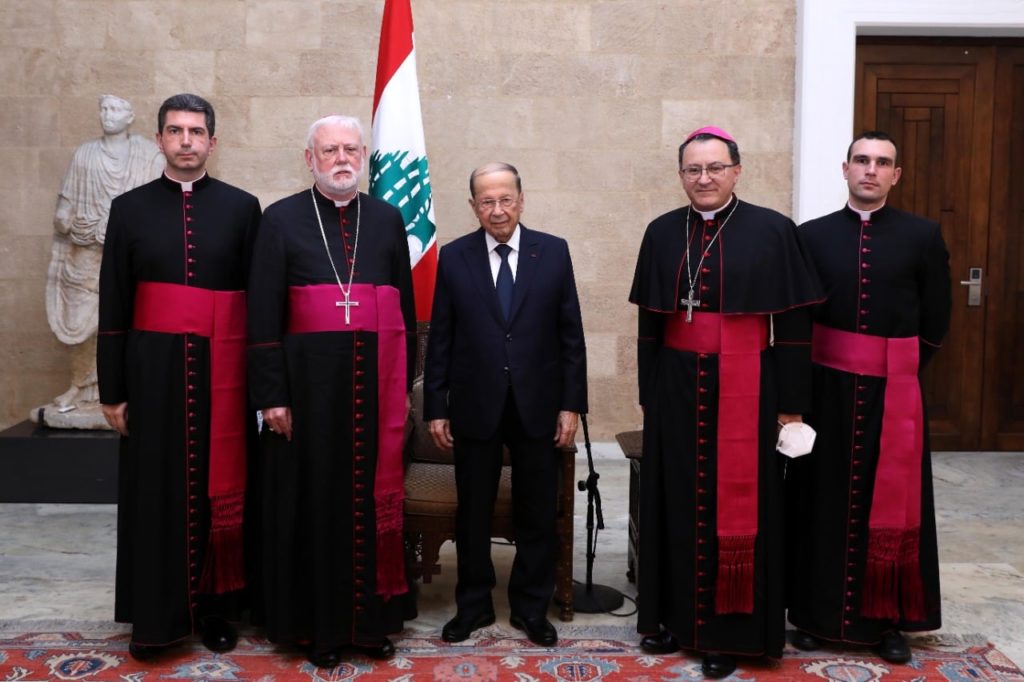![]()
Lebanon Update
“Lebanon’s Christians fought hard and for the most part successfully throughout their own challenging history, and at a great price in terms of blood and resources, to preserve what they could of their freedoms. The greatest service they could render to the rest of the region’s beleaguered Christians would be for them to remain free, and to act as a shining beacon of freedom for the others and for the Muslim majority of the region as well.”
—Lebanese expert Prof. Habib C. Malik, March 10, 2020, in an interview in Providence magazine (link)
“Lebanon deserves exceptional attention, because the entire Middle East looks to Lebanon as a message for the future, and from here comes the necessity of preserving the Lebanese national identity. If the situation develops positively, the Lebanese national identity will be reflected in the region. A strong and united Lebanon can set an example for the entire Middle East, with its Christians and Muslims, in the service of the common good for all, and this is the truth of the Lebanese call. We hope that this role will be played again in the future and it is easy to say that Lebanon is a message, but we must work together so that this message becomes a tangible reality.”
–Statement of the Holy See’s Secretary for Relations between States, Monsignor Richard Paul Gallagher, the #3 man in the Vatican, February 1, 2022, during a January 31-February 4 trip to Lebanon (link)

Msgr. Richard Paul Gallagher, the Vatican Foreign Secretary, meeting with the President of Lebanon, Michel Aoun, on February 1 in Beirut
Lebanon Report 2022: #1, The Message of Lebanon
Visit from Pope’s Representative Makes Clear the Crucial Importance of Lebanon for the Vatican
Report on the 5-day visit to Lebanon of the Vatican’s “foreign minister, Archbishop Richard Paul Gallagher, head of the Vatican’s global diplomacy
By Christopher Hart-Moynihan, Director, Friends of Lebanon Project
Some hopeful signs for Lebanon are emerging now in the wake of the visit to the country last week by the papal representative, Archbishop Richard Paul Gallagher.
Archbishop Gallagher was in Beirut from January 31 to February 4 in order to speak with top leaders in the country, along with Msgr. Joseph Spitri, Chargé d’Affairs at the Holy See’s Embassy in Lebanon, Msgr. Giuseppe Franconi and Msgr. Marco Formica. Notably, Gallagher met on February 1 with Lebanon’s President, Michel Aoun, as well as a number of other Lebanese government officials.
During the meeting with Aoun, the Vatican Foreign Minister and the Lebanese President discussed how best to support Lebanon in the midst of ongoing economic and political crises, according to transcripts of the meeting discussions (link).
The visit of the Papal representative sparked hopes that the Vatican will take a more active role in the resolution of the sectarian conflicts that have left the country without a functioning government for much of the past year.
Many international observers, including key voices in the Lebanese diaspora such as Maronite Bishop Gregory Mansour of Brooklyn, New York (link) — who heads the Maronite Lebanese Catholic community in the United States — have called for the Vatican to establish a fund to support key institutions in Lebanon, many of which are now on the brink of collapse.
These would include Catholic schools, universities and hospitals, which — in contrast to institutions funded by Hezbollah or other sectarian groups in the country — are open to all and serve as a “laboratory” for Lebanese society. Inside the walls of these Catholic institutions, Lebanese children and adults, including Sunni and Shia Muslims, are exposed to individuals from different backgrounds and faiths and begin to develop a “Lebanese” identity rather than a fundamentalist or sectarian one.
In other words, the Catholic Church — both Maronite and Roman — is, in some ways, a linchpin of Lebanese society. Sustained diplomatic and material support from the Vatican would go a long way towards ensuring that Christians continue to have a presence in Lebanon — and, by extension, in the Middle East.

A moment during the February 1 meeting of Archbishop Gallagher with President Aoun

President Aoun with Archbishop Gallagher and the Vatican delegation on February 1 in Beirut
“A Very Significant Experience”
Msgr. Gallagher is the Vatican’s Foreign Secretary, and his visit from January 31 to February 4 included meetings with both political and religious leaders.
In addition to President Aoun, Gallagher also met with President of Parliament Nabih Berry, Prime Minister Najīb Mīqātī, Minister for Foreign Affairs Abdallah Bou Habib, the Catholic and Orthodox Patriarchs and Bishops (of which there are many, due to the various Eastern and Oriental Rite Churches present in Lebanon), as well as Grand Mufti Sheikh Abdel Latif Deryan (leader of Sunni Muslims in Lebanon), Vice-President of the Shiita Superior Council Sheikh Ali El Khatib, and Sheikhat Akl of the Druze Sheikh Dr. Sami Abi El Mouna.
Archbishop Gallagher also took the opportunity to visit the site of the Beirut port explosion of August 4, 2020, where he led a moment of prayer.
Also included in his visit were visits to the (Jesuit) Université SaintJoseph and the (Lazarist) Carlo Acutis Youth Center, and an appearance at a Symposium on “Pope John Paul II and the Message of Lebanon,” which was held at the (Maronite) Holy Spirit University of Kaslik.
After his meeting with the President, Archbishop Gallagher released a statement in which he affirmed the Vatican’s commitment to peace in Lebanon. He also stated, “It is necessary to ensure that Christians can continue their efforts for the sake of the country of which they were one of its founders.” Finally, he said that the Pope “wants to come and will come” to Lebanon “very soon.”

St. John Paul II, who worked to end the Lebanese Civil War (1975-1990) and spoke many times on the importance of “the message of Lebanon”
St. John Paul II, Pope Francis, and Archbishop Gallagher on Lebanon
Throughout his visit, Archbishop Gallagher repeated a very simple message. He emphasized, first, the importance of a stable, prosperous, Lebanon where the Christian community can remain and flourish; second, the necessity of providing a future for young people so they do not flee the country; and third, Lebanon’s unique role as a model of co-existence in the entire Middle East.
An article (link) published on February 7 — three days ago — in Lebanon’s French-language newspaper L’Orient le Jour, places Gallagher’s visit in the context of the visions of two Popes — St. John Paul II and Pope Francis — for Lebanon.
Pope John Paul II, in a September 1989 letter, stated, “Lebanon is more than a country – it is a message of freedom and an example of pluralism, for the East as for the West.”
Francis, during his meeting with Lebanese religious leaders at the Vatican on July 1, 2021, affirmed that Lebanon is “a peace project” and “an oasis of fraternity, where different religions and denominations meet, where diverse communities live together by putting the common good before particular interests.”
Both of these Popes have emphasized the importance of Lebanon as a “meeting point”: a place that can serve as a model in an area of the world where Christians are often persecuted.
Archbishop Gallagher reiterated this in comments to the press, stating that “a weakening of the Christian presence risks destroying the internal balance and the very reality of Lebanon.”
To Lebanon… and to the World
All of this unfolds in the light of the blast that destroyed the port of Beirut on August 4, 2020, leaving more than 200,000 people homeless, mostly Maronite Christians.
This prompted renewed calls for international support for Lebanon, which we at Unitas: “Friends of Lebanon” have responded to by raising money to help our partners on the ground in Beirut provide food, water, and basic essentials to people in need.
Now others — like L’Orient Le Jour — are analyzing Gallagher’s visit and noting these same things — a need for political and economic stability, the importance of supporting the education of children and young people in Lebanon, and the importance of supporting and preserving the unique character of Lebanon with its ancient Christian communities.
It is important to note that these objectives are also shared by the Orthodox communities of Lebanon, offering a very promising venue for Catholics and Orthodox to work together on an important project which has ramifications for their relations, and for the religious and political culture of the entire Middle East, and beyond.
We have been doing this through our “Friends of Lebanon” project, which now has about 300 members and has given about $50,000 to assist the Maronite Christians of Lebanon.
Won’t you consider becoming a “Friend of Lebanon”?
Any donation will qualify you, and you will receive this “Lebanon Report” and be informed, from sources on the ground in Beirut, on what is happening in Lebanon today.
You will be helping to preserve the ancient Christian community of Lebanon, and laying the basis for a possible peace throughout the Middle East.
Please consider joining us.
You can view all of our previous Lebanon Reports by clicking the button below. Please share with your friends and loved ones.
As a special thank to all of our Friends of Lebanon, we will host a bimonthly Friends of Lebanon Meet & Greet on the last Friday of every other month. This event will be held on Zoom. This will give you an opportunity to hear about our latest efforts as well as to speak with those who are on the ground in Lebanon. You can join us on Friday, February 25, 2022, at 11:00 a.m. Eastern by registering here.
Please enjoy a complimentary digital edition of Inside the Vatican Magazine by clicking here.
Christopher Hart-Moynihan
Director, Friends of Lebanon Project
Urbi et Orbi Communications
